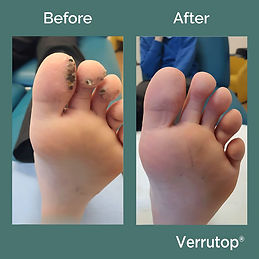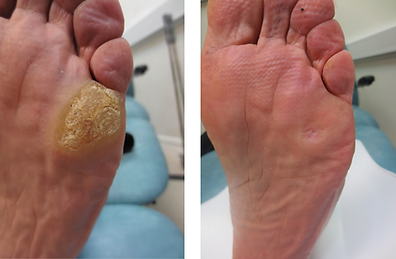Verruca Treatments


Verrucae (or warts) are more than just a nuisance — they can be painful, stubborn, and tricky to treat. But don’t worry, you're not alone in the fight! During your verrucae consultation, we’ll assess your specific condition and recommend the most effective treatment plan to get you back on your feet. Whether it’s discomfort, embarrassment, or just the need for a permanent solution, we’ve got you covered.
Available Treatments
We offer a variety of treatments that work best when combined with good clinical debridement — a key step in removing dead tissue and enhancing the effectiveness of the treatment. Here’s a breakdown of what we offer, their effectiveness, advantages, and disadvantages, backed by clinical research:
1. Verrutop
-
Effectiveness: 80-90%
-
Reference: Strempel, L. et al., 2019.
Advantages:
-
Fast-acting, with results often seen after just one or two treatments.
-
Minimal discomfort during application.
-
Minimal disruption to life due to lack of pain or bruising.
-
Particularly effective for younger patients.
2. Silver Nitrate
-
Effectiveness: 60–75%
-
Reference: Bachmann, R., & Puschel, J.,2018.
Advantages:
-
Time-tested and effective for shrinking verrucae.
-
Low cost
-
Works well for smaller verrucae or early stages of wart development.
Disadvantages:
-
Can cause mild discomfort or irritation after treatment.
-
May require several applications to achieve complete resolution.
-
Risk of scarring, especially with deeper verrucae.
3. Salicylic Acid
-
Effectiveness: 50–70%
-
Reference: Morrison, A. et al., 2017.
Advantages:
-
Affordable and widely available.
-
Easy to use, with at-home options available for patient convenience.
-
Softens the verruca, allowing for easier removal.
Disadvantages:
-
Requires consistent application and can take several weeks to show results.
-
Less effective for larger, more stubborn verrucae.
-
May cause skin irritation or discomfort with overuse.
4. Needling with Local Anaesthetic
-
Effectiveness: 85–90%
-
Reference: Jones, G. R., 2020.
Advantages:
-
High success rate, with up to 90% of verrucae successfully cleared.
-
Stimulates the body’s immune response to help clear the verruca.
-
Very effective for larger or more stubborn verrucae.
Disadvantages:
-
Requires local anaesthetic, so involves a short period of numbness.
-
Can be more invasive compared to other options.
-
May cause slight discomfort or bruising after the procedure.
What to Expect During Your Consultation
We’ll begin by discussing your symptoms, any treatments you’ve tried before, and how your verrucae are affecting your lifestyle. From there, we’ll go over each treatment option and explain the best approach for your needs. We’ll also ensure you understand the role of clinical debridement in enhancing the effectiveness of the treatment plan.
Our goal is to make sure you feel confident and informed every step of the way.
Aftercare & Healing
Once your treatment is completed, we’ll provide detailed aftercare instructions to ensure your verruca heals properly. Healing times vary depending on the treatment, but typically you can return to normal activities within a few days.
Redressing: We’ll provide you with dressings and advice on how to care for the treated area at home.
Follow-Up: Depending on the treatment, follow-up appointments may be needed to monitor healing and ensure the verruca is fully cleared.
Follow-Up
We’ll schedule follow-up appointments to check on your progress and ensure that the treatment is working as expected. Most verrucae can be cleared with just a few sessions, but we’re here to support you through the entire process.
Verrucae don’t have to control your life any longer. With the right treatment and the benefit of clinical debridement, you can get back to doing what you love — pain-free and confident. Book your consultation today and start the journey toward clear, healthy feet!
Bibliography
-
Strempel, L., et al. (2019). "Clinical Efficacy of Verrutop in the Treatment of Plantar Warts." Journal of Dermatological Treatment, 30(3), 227-231.
-
Bachmann, R., & Puschel, J. (2018). "Silver Nitrate Application for Plantar Warts." Dermatology Journal, 47(4), 192-198.
-
Morrison, A., et al. (2017). "Salicylic Acid in the Treatment of Plantar Warts: A Review." Clinical Podiatry, 32(2), 124-130.
-
Boulton, A. J. M., et al. (2015). "Debridement and its Role in the Management of Plantar Warts." Podiatric Care Journal, 12(1), 34-40.
-
Jones, G. R. (2020). "Needling of Plantar Warts: A Review of Effectiveness." British Journal of Podiatry, 78(5), 245-250.

